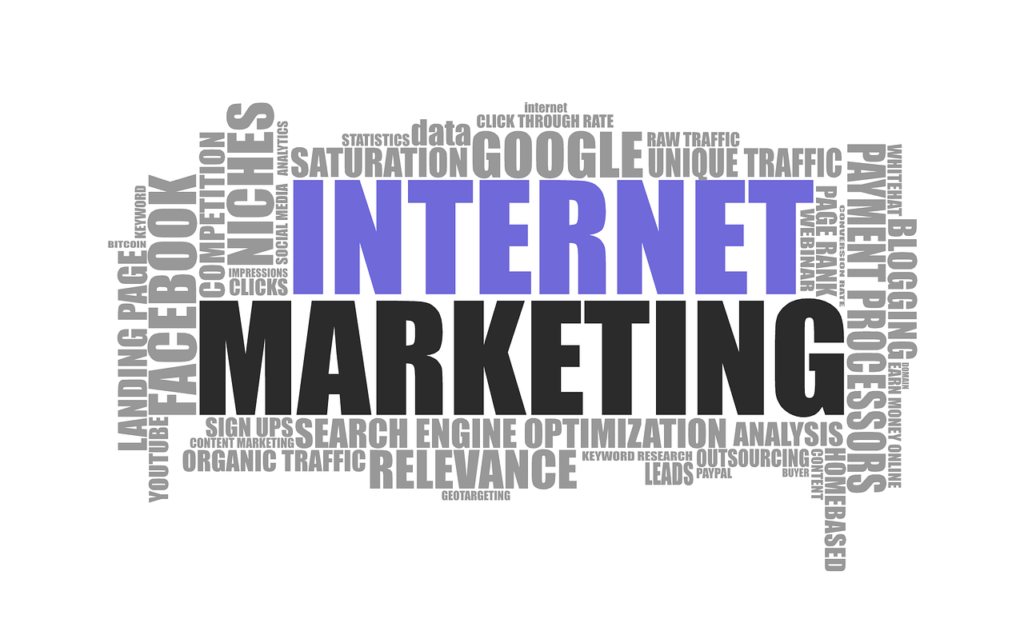Traditional marketing often conjures up images of the ‘ad-man’ pitching ideas for TV commercials to a board of execs. However, the marketing industry has evolved. With the birth of search engines, social media, and new demographic targeting strategies comes new digital marketing careers. Today, there are many opportunities to work in marketing and build brands for versatile clients. You’ll be able to find digital marketing jobs in pretty much every company.
Here is an overview of the major digital marketing fields and the role these people play in an organization. We’ll move on to discuss the main differences between digital marketing careers and traditional marketing. We’ll also describe the requirements for specific digital marketing careers and discuss the kind of person that would enjoy each role most so that you can better understand where you might fit in.

Marketing Careers Discussed in this Guide
Table of Contents
- Types of Digital Marketing Careers
- Digital Marketing vs. Traditional Marketing
- What are the Main Digital Marketing Fields?
- Digital Marketing Careers
- Education and Training Requirements
- Job Prospects and Salary Expectations
- Tips for Success in Digital Marketing Careers
- Digital Marketing Career Takeways
Types of Digital Marketing Careers
Digital marketing careers fall loosely into three major categories. Professionals can expect to be involved in all three to some extent, as digital marketing is a collaborative process that requires every part of the marketing team to understand the full picture.
Here are the three types of digital marketing careers you can expect at an agency.
Research
Research-based digital marketing careers are focused on understanding customer behavior and analyzing data to inform marketing decisions. Examples of digital marketing fields that are especially research-oriented are paid search management and content strategy.
Indirect Engagement
This field is closely related to traditional marketing campaigns. It involves using the information provided by researchers to create campaigns and deliver content that drives customers’ engagement with a brand. Careers in this field include SEO management and email marketing management.
Direct Engagement
Direct engagement is a compelling area of marketing that focuses heavily on social media. It involves providing a consistent and attractive voice for customers to engage with and relate to.
While direct engagement can produce incredible results for a brand’s reputation when achieved successfully, it’s perhaps also the riskiest of all the digital marketing fields. When you mess up, people notice, and you can’t hide behind your desk. We’ll cover a few examples of how this works (and doesn’t) later when we discuss social media. Careers in this field include social media management and public relations management.
Digital Marketing vs. Traditional Marketing
So how do digital marketing careers differ from traditional marketing careers? Hasn’t it always involved research and engagement?
Here are several differences in digital marketing that make today’s jobs unique.
Scale
The first difference lies in scale. The internet means that a brand’s potential customer pool is almost unlimited. Similarly, the research methods available to marketers have exploded with the advent of big data.
A marketer in the 80s would have killed for access to the vast cache of search data and social data provided to marketers by Facebook and Google. Search data allows marketers to understand the behavioral patterns of potential customers, while social data provides incredible insight into how brands factor into customers’ personal lives.
Conversations Rather than Campaigns
The other major difference between digital and traditional marketing is that customers have a far louder voice in the digital age than they did in the past. A 2017 survey found that 75% of customers feel that social media has empowered them to hold brands accountable and make formal complaints.
Historically, customers could boycott a company, offer negative responses in surveys, or contact a company to complain — but for the most part, the world wasn’t watching. Today’s brands are reevaluating their strategies to be socially conscious and promote good ethics.
Traditional Marketing Still Plays a Valuable Role
Digital marketers must have a grasp on how traditional advertising works as well, as marketing for TV, print, radio, etc., are all still effective.
An example of an incredibly successful combination of digital and traditional marketing strategies is the enduring compare the meerkat campaign used by the UK price comparison service Compare the Market.
What are the Main Digital Marketing Fields?
Wondering what role you could play in digital marketing? Here are the main digital marketing fields and their roles in an agency.
Search Engine Marketing
Search engine marketing is a field concerned with finding the best marketing opportunities for a company using search engines. This involves researching search terms and behavioral patterns using tools such as Google Analytics and then deliver strong results in the short term with paid advertisements.
Digital marketing careers in SEM require strong research skills, as companies have to invest money directly into the ad campaigns and see a good rate of return. Less than 10% of search users click paid ads, so understanding how to make an ad appear ultra-relevant in just a few words is an essential skill.
Content Marketing
Content marketing aims to grow a brand’s presence by creating content that is easy for customers to find and generates a high conversion rate into sales. It differs from the paid, ‘inorganic’ strategies of SEM. Content marketing uses search engine optimization (SEO), an ‘organic’ marketing method.
Content marketing also requires strong research skills: keyword research and understanding the competition are core elements of this field.
Social Media Marketing
Social media marketing involves directly engaging with customers on social media. It’s about simultaneously promoting your business through conventional tactics — advertising promotions, etc. — and creating a consistent, engaging personality that positively reinforces your brand’s personality.
This is one of the more finely balanced digital marketing fields, as the endgame is to have customers view your brand as a conversational partner and a friend rather than just a business.
91.9% of businesses with over 100 employees use social media in 2021. This should tell you how vital this strategy is considered for businesses, but it comes with risk. If you make a mistake on social media, people won’t let you forget it — potentially alienating customers and damaging your brand’s reputation. And the bigger you are, the worse it is.
Email Marketing
As the oldest of all the digital marketing fields, email marketing almost seems close to a traditional marketing strategy today. Do you read emails from brands? 78.9% of customers actively unsubscribe from brands’ mailing lists. So are there still digital marketing careers in email marketing when this is surely a dying field?
Yes, the short answer is that businesses still invest a lot in email marketing, with 30% considering it their most effective marketing strategy for ROI.
Email marketing is more effective for some industries than others. Customers see email notifications on their smartphones, so email marketing aims to convey an attractive message in the opening few words of an email. You’ll remember it when UberEats tells you that you’ve got 25% off for the next week.
Public Relations
Digital marketing careers in public relations involve monitoring a brand’s public image, promoting positive feedback, and responding effectively to negative perceptions of a brand. Today, this field is closely related to social media management and encompasses non-social media PR such as media reports.
Public relations management requires strong research skills, as you need to be constantly aware of what is being said about your brand. The digital marketing fields of public relations and SEO management are also closely related.
Pushing positive information about your company up search rankings is a key component of modern PR.
Digital Marketing Careers
We’ll now take a look at a few careers in detail to help you better understand what might suit your talents! We’ll cover educational requirements, average salaries, and the outlook for each of these digital marketing careers.
Paid Search Manager

What Does a Paid Search Manager Do?
A paid search manager is in charge of ad campaigns involving search engines. This role requires the ability to research where and when ads should be placed to generate a strong ROI.
Educational Requirements
Usually, a Bachelor’s degree in a field related to marketing & communications is required for this role. Google Ads Certification is also an important requirement.
Job Outlook & Salary
The average annual salary of a paid search manager in the U.S. is around $59,000.
As long as search engines are in demand, pay-per-click (PPC) ads will be in demand. This offers a strong outlook for paid search manager careers.
Is it Right for Me?
If you enjoy using research and analytic tools to create an effective ad campaign and watch it yield strong results, you may be a great fit for this career. An ability to handle pressure is also essential, as companies invest a lot of money in PPC ad campaigns.
SEO Manager/Analyst

What Does an SEO Manager/Analyst Do?
An SEO manager oversees SEO campaigns to grow a business’s online presence organically. Duties involve SEO research and deciding which strategies will be most effective for the business.
Educational Requirements
There are no strict educational requirements for an SEO manager/analyst, although a Bachelor’s degree in computer science, business administration, marketing, or computer science could be advantageous. Substantial experience in SEO professions is usually the main requirement.
Job Outlook & Salary
SEO managers in the U.S. earn an average annual salary of around $80,000.
Is it Right for Me?
If you’re interested in the constantly evolving field of search engines, becoming an SEO manager demands that you stay ahead of the game. You’ll need excellent research skills and a critical eye for detail, but this can be an advantageous career path.
Social Media Manager

What Does a Social Media Manager Do?
Your job as a Social Media Manager is to oversee your company’s social media presence, ensuring that a positive message is consistently presented on social media. You’ll also work closely with public relations to respond to questions or criticism on social media.
Educational Requirements
While a Bachelor’s degree in a field like communications may be useful, far more important is your experience in the field and evidence of having curated successful and engaging social media presences. Not making a weird faux-pas in your interview is also very important.
Job Outlook & Salary
The average salary for social media managers in the U.S. is around $45,000 per year. These roles often offer flexible working (such as working from home).
Social media management is likely to remain in high demand as businesses increasingly utilize their social media presence to avoid being canceled.
Is it Right for Me?
Attention. To. Detail. You need amazing powers of scrutiny as a social media manager. If you have a team working for you, then you are responsible for checking every single thing they say to ensure it’s not about to blow up in your face.
If you can remain calm under pressure, keep up with trends and enjoy engaging positively with your customer base, you’ll go far as a social media manager.
Email Marketing Campaign Manager

What Does an Email Marketing Campaign Manager Do?
Your role is to drive sales with strong email marketing campaigns that capture a customer’s interest and promote your business. You’ll manage a team responsible for coming up with ideas for coupon campaigns and snappy sales pitches.
Educational Requirements
Most companies require a Bachelor’s degree in advertising, marketing, or communications. Experience in the field may be considered a viable alternative.
Job Outlook & Salary
The entry-level salary for an email marketing manager in the U.S. is around $63,000 per year, rising to $70,000 with experience.
Roles in advertising and promotions are projected to increase by 6% in the U.S. up to 2029, a stronger-than-average outlook.
Is it Right for Me?
The skills that will help you flourish in email marketing are unsurprisingly similar to those prized in traditional marketing. If you’ve got a good eye for a turn of phrase and a solid understanding of sales campaigns, you could flourish in this position.
Digital Marketing Manager

What Does a Digital Marketing Manager Do?
You’ll be responsible for overseeing your company’s digital marketing operations. You’ll coordinate strategies between departments and ensure that all approaches are helping to drive sales.
Educational Requirements
You’ll usually need a Bachelor’s degree in marketing or a related field, with some companies asking for a Master’s degree in business administration for senior positions. You can also become a marketing manager even if you have a degree in an unrelated area but have the willingness and drive to learn, along with some business experience under your belt.
Job Outlook & Salary
The average salary for a digital marketer in the U.S. is around $56,000. This may rise substantially for senior roles. Digital marketing management is considered one of the 10 most in-demand jobs.
Is it Right for Me?
You’ll need to combine strong people-management skills with up-to-date knowledge of the best digital marketing practices and strategies. It’s a great role for people who enjoy challenging, fast-paced environments.
Content Strategist

What Does a Content Strategist Do?
A content strategist determines how a company can enhance its online presence and boost sales through engaging content. You’ll need excellent research skills and in-depth knowledge of SEO for this role.
Educational Requirements
Many companies require a Bachelor’s or even a Master’s degree in a field such as marketing or communications. However, extensive experience in a content-oriented field also goes a long way.
Job Outlook & Salary
Content strategists earn an average annual salary of around $72,000 in the U.S.
Content strategy is interdisciplinary, meaning that some job positions may include this role without explicitly stating it. The availability of positions may seem lower than expected, but every company with an online presence requires a content strategist in some form.
Is it Right for Me?
You’ll need an analytical mind and a results-driven approach. If you enjoy the challenge of working with search engines and gradually securing your company’s place in the top rankings, you could find this a very satisfying career path.
Public Relations Manager

What Does a Public Relations Manager Do?
A public relations manager is responsible for maintaining a brand’s public image. You’ll determine your company’s response to reactions for or against the brand.
Educational Requirements
You will normally need a Bachelor’s degree in a field such as communications or journalism. Successful experience in the field is also considered highly desirable.
Job Outlook & Salary
Public relations managers earn an average of around $56,000 in the U.S. per year.
Careers in public relations management are projected to grow by an impressive rate of 9% from 2019 to 2029.
Is it Right for Me?
If you enjoy diplomacy and have strong problem-solving skills, you may do well as a public relations manager. You’ll need to be able to come up with effective responses to worst-case scenarios and understand how to promote your brand consistently.
Education and Training Requirements
Digital marketing careers often have diverse education and training requirements. As the field is constantly evolving, professionals in this industry must stay updated and continuously develop their skills. Let’s explore the education and training requirements for digital marketing careers:
Educational Backgrounds for Digital Marketing Careers
While a bachelor’s degree in marketing, communications, or a related field is often preferred, many digital marketing professionals come from diverse educational backgrounds. Some may possess degrees in business, journalism, graphic design, or even computer science. In the digital marketing field, the focus is often more on the individual’s skills, experience, and ability to adapt to changes in the industry than on their formal education.
Role of Certifications and Professional Development Courses
Certifications and professional development courses play a significant role in advancing digital marketing careers. These programs help professionals stay updated on the latest trends, tools, and best practices in the industry. Many courses and certifications are available online, making it convenient for professionals to enhance their skills while working. Popular certifications include Google Ads, Google Analytics, Facebook Blueprint, and HubSpot Inbound Marketing.
Importance of Hands-On Experience and Internships
In the digital marketing industry, hands-on experience is often as valuable as formal education. Internships, freelance projects, and volunteer work provide opportunities to apply learned concepts, develop practical skills, and build a portfolio. Gaining experience in various digital marketing roles and platforms can help professionals identify their strengths and interests, paving the way for a successful career in the field.

Job Prospects and Salary Expectations
As digital marketing continues to grow in importance, so do the job prospects and salary expectations for professionals in this field. Let’s explore the current demand, future growth, and average salary ranges for digital marketing roles:
Current Demand for Digital Marketing Professionals
The demand for digital marketing professionals has grown significantly in recent years due to the increasing reliance of businesses on digital channels to reach their target audiences. As companies invest more in their online presence, professionals with skills in SEO, social media, content marketing, and other digital marketing areas are highly sought after. This trend is expected to continue as digital marketing becomes even more essential for business success.
Future Growth and Trends in Digital Marketing Careers
With the rapid evolution of digital technologies and consumer behaviors, digital marketing careers are expected to see continued growth in the coming years. Professionals who stay up-to-date with industry trends and adapt to new tools and platforms will be well-positioned to capitalize on emerging opportunities. Some areas expected to see significant growth include data-driven marketing, artificial intelligence, and video marketing.
Average Salary Ranges for Different Digital Marketing Roles
Salary expectations for digital marketing roles can vary widely depending on factors such as experience, location, and industry. On average, entry-level positions may offer salaries in the range of $40,000 to $50,000 per year, while more experienced professionals can earn between $60,000 and $100,000 or more annually. Some of the highest-paying roles in digital marketing include digital marketing managers, marketing directors, and marketing strategists. Keep in mind that these figures are just rough estimates and can vary based on individual circumstances.
Tips for Success in Digital Marketing Careers
As you embark on your journey in the digital marketing field, there are several strategies you can employ to maximize your success. Here are some tips to help you thrive in this exciting and ever-evolving industry:
Developing a Strong Online Presence and Personal Brand
Having a strong online presence and personal brand can significantly impact your digital marketing career. Showcase your skills, knowledge, and experience through your website, blog, or social media profiles. By creating and sharing valuable content, you can demonstrate your expertise and build credibility within the industry.
Networking and Building Relationships within the Industry
Networking is essential for building connections and staying informed about the latest trends and opportunities. Attend industry events, join online forums, and participate in social media groups to engage with other digital marketing professionals. Building relationships can lead to new opportunities, collaborations, and a deeper understanding of the industry.
Staying Up-to-Date with Digital Marketing Trends and Technologies
Digital marketing is an ever-changing field, and staying current with the latest trends and technologies is crucial for success. Regularly read industry blogs, attend webinars, and follow thought leaders to keep your knowledge up-to-date and ensure you’re well-equipped to adapt to new developments.
Pursuing Continuous Learning and Skill Development
Continuous learning and skill development are essential in the digital marketing industry. Pursue certifications, online courses, and workshops to enhance your skill set and stay competitive in the job market. As you acquire new skills, be sure to update your resume and online profiles, showcasing your commitment to professional growth.
Digital Marketing Career Takeways
There’s no denying you have plenty of career choices within digital marketing. You’ll need to find the career that best matches your skillset. If you love speaking on behalf of friends, then you can cross off research-based careers like search engine marketer off your list.
We recommend preparing for any of these digital marketing careers by shaping your education based on which career path you’re most interested in. If you’re choosing your specialization early and stick with it — it will lead you on a career path that’s challenging, exciting, and fulfilling. Whether you’re seeking a career change or looking to upskill for a higher level job, there are plenty of educational opportunities to help you move forward.
